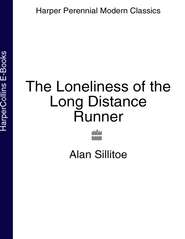По всем вопросам обращайтесь на: info@litportal.ru
(©) 2003-2025.
✖
Saturday Night and Sunday Morning
Настройки чтения
Размер шрифта
Высота строк
Поля
‘What will they think on next!’ Seaton said, after glancing upwards and seeing a television aerial hooked on to almost every chimney, like a string of radar stations, each installed on the never-never.
They turned on to Eddison Road by the big red-bricked canteen. The November sky was clear and dark-blue, with some stars still showing whitely. ‘Everybody’ll ‘ave little baby ‘elicopters,’ Arthur answered readily. ‘You’ll see. Five-bob-a-week-and-misses for ten years and you can go and see your mate at Derby in lunch-hour.’
‘Some ‘opes,’ the old man scoffed.
‘I read it in the paper,’ Arthur said. ‘It was the one last Thursday, I think, because my snap was wrapped-up in it, that they’ll get to the moon in five years. In ten they’ll be having cheap-day returns. It’s true right enough.’
Seaton laughed. ‘You’re crackers, Arthur. You’ll grow-up one day and stop telling these tales. You’re nearly twenty-two. You should know better. I thought they’d a cured you on it in the army, but I can see they didn’t.’
‘The on’y thing the army cures you on,’ Arthur retorted, ‘is never to join the army again. They’re dead good at that.’
‘When I was a lad they din’t even have wireless sets,’ Seaton ruminated. ‘And now look at what they’ve got: television. Pictures in your own ‘ouse.’
They were caught by the main ingoing stream: bicycles, buses, motor-bikes, and pedestrians on a last-minute rush to breach one of the seven gates before half-past. Arthur and his father walked in by the hexagonal commissionaires’ office, a building in the centre of a wide roadway dividing the factory into two unequal parts. Seaton was on viewing in the three-speed shop, so turned off after a hundred yards.
‘See yer’t dinnertime, Arthur.’
‘Tarr-ar, Dad.’
Arthur walked into a huge corridor, searching an inside pocket for his clocking-in card and noticing, as on every morning since he was fifteen — except for a two-year break in the army — the factory smell of oil-suds, machinery, and shaved steel that surrounded you with an air in which pimples grew and prospered on your face and shoulders, that would have turned you into one big pimple if you did not spend half an hour over the scullery sink every night getting rid of the biggest bastards. What a life, he thought. Hard work and good wages, and a smell all day that turns your guts.
The bright Monday-morning ring of the clocking-in machine made a jarring note, different from the tune that played inside Arthur. It was dead on half-past seven. Once in the shop he allowed himself to be swallowed by its diverse noises, walked along lanes of capstan lathes and millers, drills and polishers and hand-presses, worked by a multiplicity of belts and pulleys turning and twisting and slapping on heavy well-oiled wheels overhead, dependent for power on a motor stooping at the far end of the hall like the black shining bulk of a stranded whale. Machines with their own small motors started with a jerk and a whine under the shadows of their operators, increasing a noise that made the brain reel and ache because the weekend had been too tranquil by contrast, a weekend that had terminated for Arthur in fishing for trout in the cool shade of a willow-sleeved canal near the Balloon Houses, miles away from the city. Motor-trolleys moved up and down the main gangways carrying boxes of work — pedals, hubs, nuts, and bolts — from one part of the shop to another. Robboe the foreman bent over a stack of new timesheets behind his glass partition; women and girls wearing turbans and hair-nets and men and boys in clean blue overalls, settled down to their work, eager to get a good start on their day’s stint; while sweepers and cleaners at everybody’s beck and call already patrolled the gangways and looked busy.
Arthur reached his capstan lathe and took off his jacket, hanging it on a nearby nail so that he could keep an eye on his belongings. He pressed the starter button, and his motor came to life with a gentle thump. Looking around, it did not seem, despite the infernal noise of hurrying machinery, that anyone was working with particular speed. He smiled to himself and picked up a glittering steel cylinder from the top box of a pile beside him, and fixed it into the spindle. He jettisoned his cigarette into the sud-pan, drew back the capstan, and swung the turret on to its broadest drill. Two minutes passed while he contemplated the precise position of tools and cylinder; finally he spat on to both hands and rubbed them together, then switched on the sud-tap from the movable brass pipe, pressed a button that set the spindle running, and ran in the drill to a neat chamfer. Monday morning had lost its terror.
At a piecework rate of four-and-six a hundred you could make your money if you knocked-up fourteen hundred a day — possible without grabbing too much — and if you went all out for a thousand in the morning you could dawdle through the afternoon and lark about with the women and talk to your mates now and again. Such leisure often brought him near to trouble, for some weeks ago he stunned a mouse — that the overfed factory cats had missed — and laid it beneath a woman’s drill, and Robboe the gaffer ran out of his office when he heard her screaming blue-murder, thinking that some bloody silly woman had gone and got her hair caught in a belt (big notices said that women must wear hair-nets, but who could tell with women?) and Robboe was glad that it was nothing more than a dead mouse she was kicking up such a fuss about. But he paced up and down the gangways asking who was responsible for the stunned mouse, and when he came to Arthur, who denied having anything to do with it, he said: ‘I’ll bet you did it, you young bogger.’ ‘Me, Mr Robboe?’ Arthur said, the picture of innocence, standing up tall with offended pride. ‘I’ve got so much work to do I can’t move from my lathe. Anyway, I don’t believe in tormenting women, you know that. It’s against my principles.’ Robboe glared at him: ‘Well, I don’t know. Somebody did it, and I reckon it’s you. You’re a bit of a Red if you ask me, that’s what you are.’ ‘Now then, that’s slander,’ Arthur said. ‘I’ll see my lawyers about you. There’s tons of witnesses.’ Robboe went back to his office, bearing a black look for the girl inside, and for any tool-setter that might require his advice in the next half-hour; and Arthur worked on his lathe like a model of industry.
Though you couldn’t grumble at four-and-six a hundred the rate-checker sometimes came and watched you work, so that if he saw you knock up a hundred in less than an hour Robboe would come and tell you one fine morning that your rate had been dropped by sixpence or a bob. So when you felt the shadow of the rate-checker breathing down your neck you knew what to do if you had any brains at all: make every move more complicated, though not slow because that was cutting your own throat, and do everything deliberately yet with a crafty show of speed. Though cursed as public enemy number one the rate-checker was an innocuous-looking man who carried a slight stoop everywhere he went and wore spectacles, smoking the same fags as you were smoking, and protecting his blue pinstriped suit with a brown staff-overall, bald as a mushroom and as sly as a fox. They said he got commission on what reductions he recommended, but that was only a rumour, Arthur decided, something said out of rancour if you had just been done down for a bob. If you saw the rate-checker on your way home from work he might say good evening to you, and you responded to this according to whether or not your rate had been tampered with lately. Arthur always returned such signs with affability, for whenever the rate-checker stood behind him he switched his speed down to a normal hundred, though once he had averaged four hundred when late on his daily stint. He worked out for fun how high his wages would be if, like a madman, he pursued this cramp-inducing, back-breaking, knuckle-knocking undiplomatic speed of four hundred for a week, and his calculations on the Daily Mirror margins gave an answer of thirty-six pounds. Which would never do, he swore to himself, because they’d be down on me like a ton of bricks, and the next week I’d be grabbing at the same flat-out lick for next to nowt. So he settled for a comfortable wage of fourteen pounds. Anything bigger than that would be like shovelling hard-earned money into the big windows of the income-tax office — feeding pigs on cherries, as mam used to say — which is something else against my principles.
So you earned your living in spite of the firm, the rate-checker, the foreman, and the tool-setters, who always seemed to be at each other’s throats except when they ganged-up to get at yours, though most of the time you didn’t give a sod about them but worked quite happily for a cool fourteen nicker, spinning the turret to chamfer in a smell of suds and steel, actions without thought so that all through the day you filled your mind with vivid and more agreeable pictures than those round about. It was an easier job than driving a lorry for instance where you had to have your wits about you — spin the turret and ease in the blade-chamfer with your right hand — and you remembered the corporal in the army who said what a marvel it was the things you thought of when you were on the lavatory, which was the only time you ever had to think. But now whole days could be given up to wool-gathering. Hour after hour quickly disappeared when once you started thinking, and before you knew where you were a flashing light from the foreman’s office signalled ten o’clock, time for white-overalled women to wheel in tea-urns and pour out their wicked mash as fast as they could from a row of shining taps.
Arthur refused the firm’s tea because it was strong, not from best Ceylon tips but from sweepings-up in the tea warehouse and the soda they doused it with in the canteen. One day he spilled some of their orange brew on a bench — thus went his story — and tried for three hours to rub out the stain, and even the ingenuity of the mechanics could make no inroads against the faint testament of unswallowable tea that stayed there as a warning to all who saw it, telling them to bring their own drink to work, though few bothered to take the hint. ‘If it makes that stain on an old wooden bench covered with oil, what do you think it does to your guts?’ Arthur asked his mates. ‘It don’t bear thinking about.’ He complained at the head office about it and they listened to him. A director examined the canteen tea urns and found the insides coated with an even depth of tea and soda sediment. Because Arthur stood up for his rights a big noise was made, and thereafter the quality improved, though not enough to induce Arthur to drink it. He still came to the factory with a flask sticking out of his pocket, and took it out now after switching off his machine, because the light began flashing from Robboe’s office, and men were unwrapping packets of sandwiches.
He walked over to Brenda’s husband, Jack, who sat on his tool-setter’s bench between a clamped-on vice and a carborundum wheel, a mug of the firm’s tea in one hand and a cheese sandwich in the other; half the cheese sandwich was already in his mouth, and the other half was on its way there.
‘Udge-up,’ Arthur said, sitting beside him on the bench. ‘Mek room for a rabbit-arse!’
‘Don’t knock my tea over,’ Jack said.
Arthur unscrewed the cap from his flask and poured out a cup of scalding tea. ‘Try a drop,’ he offered. ‘That stuff you’ve got’ll give yer a bilious-bout.’
Jack unwrapped another sandwich. Arthur had a big enough pack himself, but he wished Jack would offer him one, cut and spread by Brenda’s own hands. Even if he did, I wouldn’t take it, he cursed to himself. Christ, I’ll give myself away one of these days.
‘This tea’s good enough for the others,’ Jack said, ‘so it’s good enough for me. I’m not fussy.’ His Monday-morning overalls were stiff and clean, with as yet only a few file-stains near the breast pocket, and his collarless plain blue shirt was fastened loosely by a stud at the neck. He had a young fresh-looking face of twenty-nine or thirty, but marred by a continual frown that subjected him to pitiless teasing by the men whose machines he looked after.
‘Then you should be fussy,’ Arthur said with deep conviction. ‘Everybody should be fussy. Some blokes ‘ud drink piss if it was handed to ‘em in China cups.’
Jack’s face relaxed. Not swearing himself, it didn’t put him out to hear it from other people. ‘No,’ he said, ‘they wouldn’t go that far. I suppose I could get Brenda to make me a flask up in the mornings, but I don’t want to put her to the trouble.’
‘It’s no trouble,’ Arthur said, snapping a piece out of his sandwich.
‘It might be, with two kids to look after. Young Jacky’s a bogger. He fell down the stairs yesterday afternoon.’
More quickly than was necessary, Arthur asked: ‘Did he do hisself any damage?’
‘A few bruises and screaming for two hours. But he’s all right. He’s like iron, if you ask me.’
Time to change the subject. Like treading on a haystack, he told himself, you dirty sinner. Will this be a quick enough change?
‘How did you go on at the races?’
‘All right. I won five quid.’
It was. ‘Lucky bastard,’ he swore. ‘I put ten bob each way on the three-thirty at Redcar on Sat’day and I didn’t get a penny back. I’ll smash that bookie one of these days.’
‘Why smash the bookie?’ reasonable Jack asked. ‘You’re too superstitious. You either win or you don’t. I don’t believe in luck.’
Arthur screwed his sandwich paper into a ball and threw it across the gangway into somebody’s work-box. ‘Spot-on,’ he cried. ‘See that, Jack? Couldn’t a done better if I’d ‘ave aimed.’
‘I don’t think luck ever did anybody any good, in the end,’ Jack went on.
‘I do,’ Arthur affirmed. ‘Mostly I’m lucky and all. But sometimes I get a smack between the eyes. Not often though. So I’m superstitious and I believe in luck.’
‘You was only telling me you believed in communism the other week,’ Jack said reproachfully, ‘and now you talk about luck and superstition. The comrades wouldn’t like that,’ he ended with a dry laugh.
‘Well,’ Arthur said, his mouth full of second sandwich and tea, ‘if they don’t like it, they can lump it.’
‘That’s because you’ve got nowt to do wi’ ‘em.’
‘I said I was as good as anybody else in the world, din’t I.’ Arthur demanded. ‘And I mean it. Do you think if I won the football pools I’d gi’ yo’ a penny on it? Or gi’ anybody else owt? Not likely. I’d keep it all mysen, except for seeing my family right. I’d buy ‘em a house and set ‘em up for life, but anybody else could whistle for it. I’ve ‘eard that blokes as win football pools get thousands o’ beggin’ letters, but yer know what I’d do if I got ‘em? I’ll tell yer what I’d do: I’d mek a bonfire of ‘em. Because I don’t believe in share and share alike, Jack. Tek them blokes as spout on boxes outside the factory sometimes. I like to hear ‘em talk about Russia, about farms and power-stations they’ve got, because it’s interestin’, but when they say that when they get in government everybody’s got to share and share alike, then that’s another thing. I ain’t a communist, I tell you. I like ‘em though, because they’re different from these big fat Tory bastards in parliament. And them Labour bleeders too. They rob our wage packets every week with insurance and income tax and try to tell us it’s all for our own good. I know what I’d like to do with the government. I’d like ter go round every factory in England with books and books of little numbers and raffle off the ‘Ouses o’ Parliament. “Sixpence a time, lads,” I’d say. “A nice big ‘ouse for the winner” — and then when I’d made a big packet I’d settle down somewhere with fifteen women and fifteen cars, that I would.
‘But did I tell yer, Jack, I voted communist at the last election? I did it because I thought the poor bloke wouldn’t get any votes. I allus like to ‘elp the losin’ side. You see, I shouldn’t have voted either, because I was under twenty-one, but I used Dad’s vote because he was in bed wi’ a bad back. I took ‘is votin’ card out of ‘is coat pocket wi’out ‘im knowin’, and at the booth I towd the copper outside and the bloke at the desk inside that I was ‘Arold Seaton and they didn’t even bother to look at the card, and I went in and voted. Just like that. I didn’t believe it mysen till I was outside again. I’d do owt like that though, I would.’
‘You’d have got ten years in clink if they’d caught you,’ Jack said. ‘It’s a serious thing. You were lucky.’
Arthur was triumphant. ‘I told yer I was. But that’s what all these looney laws are for, yer know: to be broken by blokes like me.’
‘Don’t be too cocky though,’ Jack rebuked him. ‘You might cop it, one day.’
‘’What for? Like gettin’ married, you mean? I’m not that daft.’
Jack defended where Arthur had made him feel vulnerable: ‘I’m not saying you are. Neither was I daft when I got married. I wanted to do it, that’s all. I went into it wi’ my eyes open. I like it, and all. I like Brenda, and Brenda likes me, and we get on well together. If you’re good to each other, married life is all right.’
‘I’ll believe you then. Thousands wouldn’t, though.’
Who would believe anyway that I was carrying on with his missis? One day he’ll know, I suppose, but don’t be too cocky, you cocky bastard. If you’re too cocky your luck changes, so be careful. The worst of it is that I like Jack. Jack is a good bloke, one of the best. It’s a pity it’s such a cruel world. But he’s one up on me because he sleeps with Brenda every night. I suppose I should keep on hoping he gets knocked down by a double-decker bus so that I can marry Brenda and sleep with her every night, but somehow I don’t want him to get knocked down by a bus.
‘I haven’t told you this, have I?’ Jack said gravely after a long pause of munching, as though something big and heavy had suddenly climbed up to his conscience.










